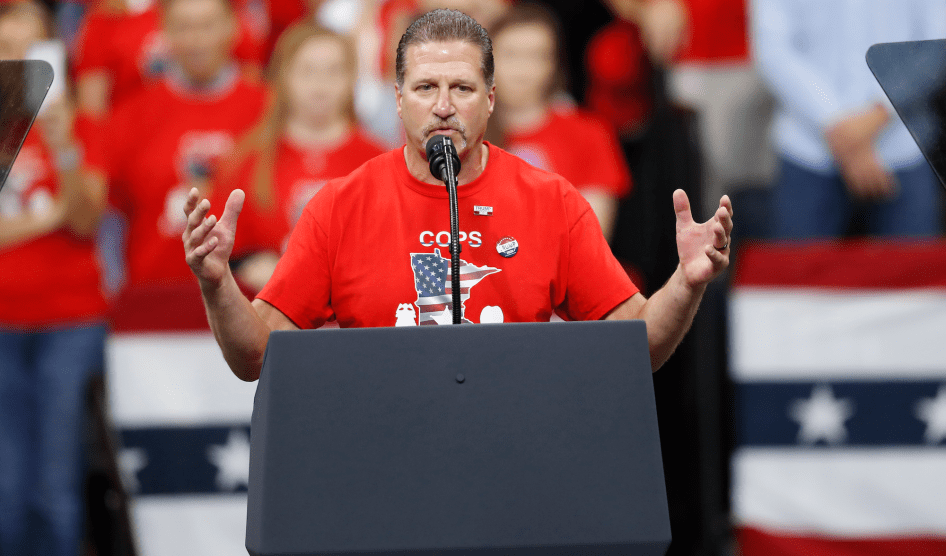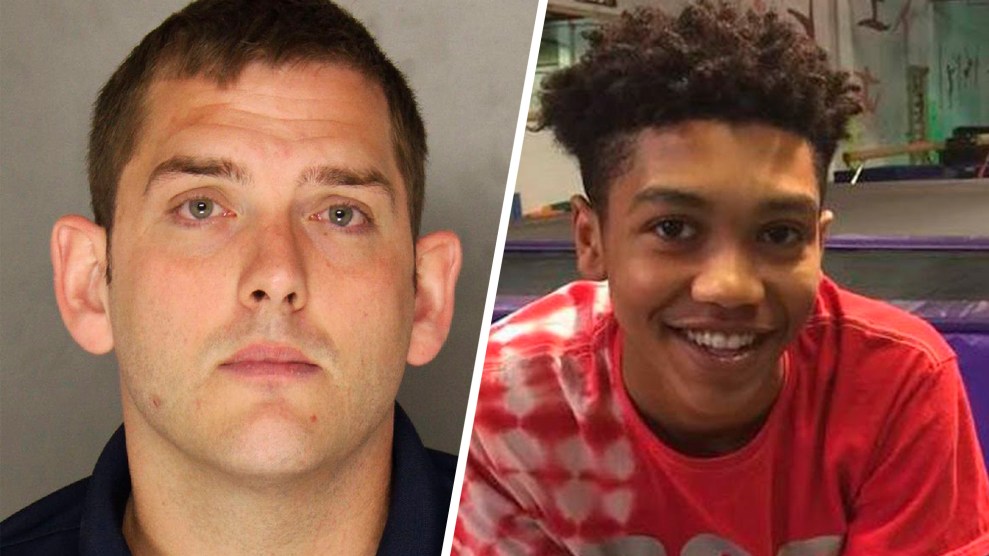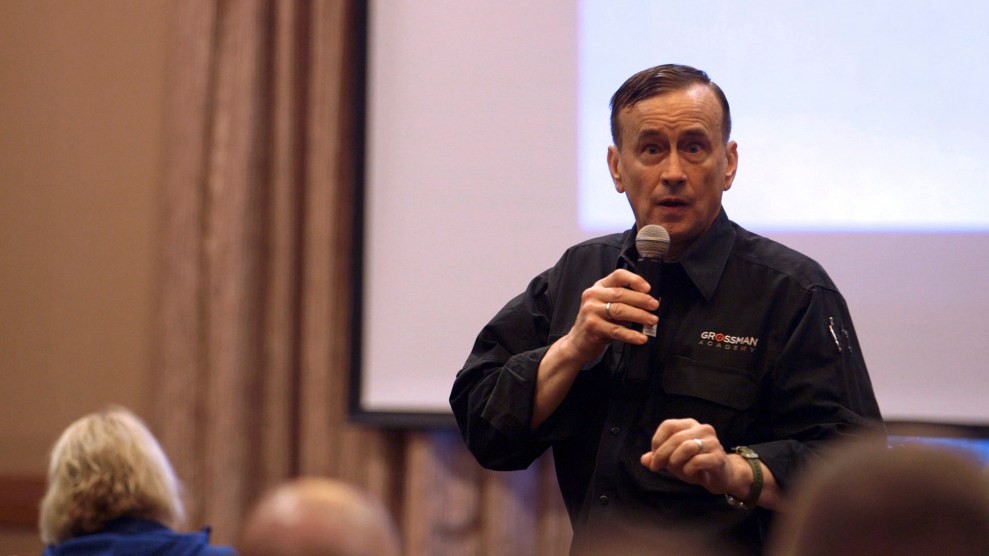Early one morning in June 2015, after Kris Jackson had been fighting loudly with his girlfriend, a police officer knocked on the door to their motel room a few blocks from California’s Lake Tahoe. Jackson, a Black 22-year-old who was on probation for a drug offense, did not stick around to deal with the cops. Wearing only a pair of shorts, he hoisted himself partway out of the bathroom window into the cool, dark air of the motel’s back alley. That’s when another officer, Joshua Klinge, rounded the corner of the building, spotted Jackson hanging out the window, and shot him from several feet away. Klinge later claimed that Jackson looked “aggressive” and had a gun. No gun was found. Jackson died at the hospital a few hours later.
As in the majority of police killings, the local district attorney did not charge Klinge, who was placed on paid leave before being allowed to retire quietly. Jackson’s parents filed a federal lawsuit against the officer, several police department staff, and the city of South Lake Tahoe, arguing that not only had Klinge used excessive force against their son, but that the police department had an illegal policy allowing him to do so. That policy, written by a company called Lexipol, stated that officers could use deadly force to protect themselves or others from any “imminent” threat of serious injury or death. An “imminent” threat, the policy explained, was broader than an “immediate” threat such as someone pointing a gun. It included any situation in which a “reasonable officer” would believe a suspect had a weapon and intended to use it.
Lexipol says it has provided policies, training, or services to 8,100 public safety agencies, offering customizable handbooks and instruction modules to police departments as well as fire, EMS, and corrections agencies. According to the company, its copyrighted policies, which cover everything from avoiding racial profiling to policing protests, are based on “best practices” as well as federal and state standards and recent laws and court rulings. Since Lexipol was founded nearly 20 years ago, its model has proved immensely popular with smaller police departments that may not have the resources to keep their own policy manuals updated. Yet its policies are also used by larger cities, including Oakland and Salt Lake City. As many as 95 percent of law enforcement agencies in California have purchased Lexipol policies or received them through their insurers.
Some of the company’s policies, including the use-of-force policy challenged by Jackson’s family, depart in significant ways from recommendations by mainstream policing organizations. The National Consensus Policy on Use of Force, a collaboration between 11 major law enforcement groups, requires cops to try deescalation techniques before using force if possible. Lexipol discourages police departments from requiring them. Lexipol’s policy allows officers to shoot at moving vehicles in some circumstances, a practice that the Police Executive Research Forum recommends against because it may injure or kill civilians and officers. The ACLU has contested Lexipol’s rules for handling immigration violations, which in some states include a provision allowing cops to consider “a lack of English proficiency” when deciding whether someone may have entered the country illegally.
Despite these challenges, the company has marketed its policies as a way to decrease cities’ liability in police misconduct lawsuits. In its communications with potential clients, Lexipol has claimed that agencies that use its policies are sued less frequently and pay out smaller settlements, according to a Texas Law Review analysis of public records. The company’s critics argue that it accomplishes this with vague or permissive rules that meet bare-minimum legal requirements rather than holding officers to a higher standard. “They want to make it impossible, or nearly impossible, for anybody to point to the policy and say it was violated,” says Carl Takei, an ACLU senior staff attorney specializing in police practices. “Defining ‘imminent’ in a way that removes all of the imminence? That’s a classic Lexipol policy.” Samuel Sinyangwe, a racial justice activist and data analyst who has looked at hundreds of police departments’ policies, concludes that Lexipol’s use-of-force guidelines usually lack requirements that have been shown to reduce police violence. Lexipol did not respond to a request for comment.
Lexipol was started in 2003; two of its three founders were former cops who became lawyers. One, Bruce Praet, spent a decade as an officer in Orange County, where he twice beat misconduct lawsuits, according to a 1992 Los Angeles Times profile. Inspired by his defense lawyer, Michael Stone—who later represented one of Rodney King’s assailants—Praet went on to become a police union lawyer before starting a firm that specialized in defending cops in cases involving shootings, pursuits, and dog bites. In 1998, he co-wrote the precursor to Lexipol’s first law enforcement manual. From the last three years alone, he has defended police in nearly three dozen federal lawsuits.
Praet is explicit about his desire to give police officers as much discretion as possible. “One of our secret sauces, so to speak, is rarely if ever will you see the use of the word ‘shall’ in our policies,” he told officials during a webinar last year. “Nothing in police work is black and white except the car you drive…so policies need to be flexible.” Today, he serves on Lexipol’s board while continuing to defend cops across California. “Every single case, he argues that the officer just followed his policies and training,” says Michael Haddad, an attorney who has faced off against Praet in several police misconduct lawsuits and is representing Kris Jackson’s father. Praet did not respond to a request for comment.
Multiple police departments that have been sued over Lexipol-authored policies have turned to Praet to defend them. “It’s sort of a form of double dipping,” Takei, the ACLU attorney, says. “The local government is paying for a Lexipol policy that’s marketed on the premise that it would prevent lawsuits—and is paying again when officers kill people, and then their family sues the local government.”
In the South Lake Tahoe case, a federal judge has spent more than a year considering Haddad’s argument that Lexipol’s expansive definition of an “imminent” threat violated the Fourth Amendment’s protection from unreasonable searches or seizures. In the meantime, California’s legislature passed the Act to Save Lives, which promised to hold officers to a higher standard by allowing them to shoot people only when “necessary,” not just when “reasonable.” The bill lost support from the Black Lives Matter Global Network and other activists after its backers made concessions to police groups, including removing the definition of “necessary.” After it passed, Lexipol updated its California use of force policy, including its definition of “imminent,” to match the bill’s language. But the company maintains that little has really changed. In a webinar with police officials last year, Praet hinted that he had personally worked with legislators to water down the bill, which he said was “near and dear” to his heart. “We—law enforcement—got 95 percent of what we needed out of [the bill],” he assured them.
“They have one private company that has the power to rewrite the use-of-force standards for America’s largest state, and that’s just unacceptable,” says Sinyangwe, who was involved in the fight over the bill. “These are policies that are life and death. They are policies that ought to be shaped with input from community members, and instead they’re being written by a private corporation that very clearly aligns with the police narrative that use of force is justified and acceptable, even in cases where it’s unnecessary.”
About a year after her son, Kris, was killed, Angela Ainley drove to South Lake Tahoe to stay in the motel room where he was shot. She climbed into the small bathroom window and sat there, staring into the dark alley, trying to understand what her son had experienced. “He was trying to get out the window because he was afraid,” she says. She believes Klinge lied about seeing a gun, and that Praet is helping the police department cover for him. Patrick Jackson, Kris’ father, says he hasn’t smiled since his son was killed. “I just want justice for my family,” he says. He hopes their case could help end a system in which police get away with killing people simply because they perceive a threat. “Until they really solve that problem, until they take away that ability to have that excuse,” he says, “I don’t know what they’re really changing.”









